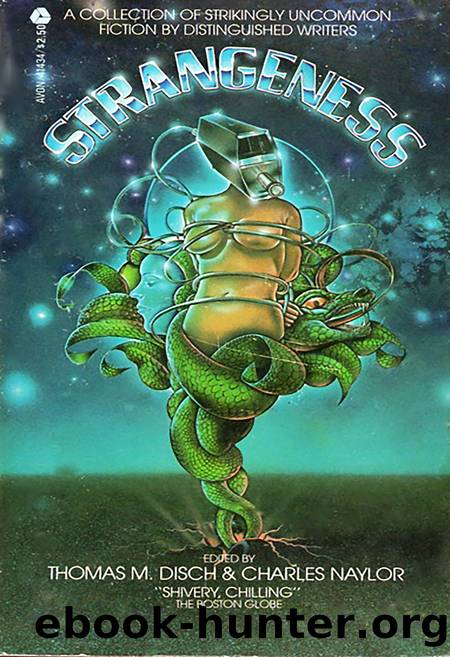Strangeness by Thomas M. Disch & Charles Naylor

Author:Thomas M. Disch & Charles Naylor [Disch, Thomas M. & Naylor, Charles]
Language: eng
Format: epub
ISBN: 0380414341
Publisher: Avon
Published: 1978-11-30T21:00:00+00:00
Heat pumped down the valley from the secret fastnesses of Flat Crags, from the dry fall at Hell Ghyll; up in the high gullies, the rock sang with it. Further down, the hanging Langdale oakwoods were sapless, submissiveâheat had them by the throat. A sense of immanence filled the unlovely living room of the Lyall cottage, reeked on the stairs, fingered out from the bedroom like ectoplasm from a medium. Lyall took to staring for hours at the crack in the wall, hands clasped between his knees. His wife was quiet and tense. Her despairing cry in the dark still hung between them.
Into this strange stasis or prostration, like a low, insistent voice, a thousand small accidents introduced themselves: the insect bite, the hand slipping on the can-opener, a loss of balance on the stairâcuts, rashes, saucepans dropped, items lost or broken; a constant, ludicrous, nerve-wracking communication from the realm of random incidence. For half a day the kitchen taps refused to give water of any sort, then leaked a slow, rusty liquor even when turned off; four slates fell from the roof in an afternoon of motionless air; Lyallâs wife suddenly became allergic to the sun, and walked about disfigured.
Lyallâs response to these events was divided equally between irritation and apathy. He brooded. Several times he took me aside as if to broach some mutually embarrassing subject, and on each occasion failed. I couldnât help him: the raging contempt of his Cambridge days, applied with as much rigor to his own motives as to those of others, was by now a memory. Out in one of the barns, cutting a piece of zinc to mend the roof, he said, âDonât you ever regret your childhood, Egerton?â
I didnât think I did; I didnât think childhood meant much after a certain age. I had to shout this over the screech of the hacksaw. He watched my lips for a while, like a botanist with an interesting but fairly common specimen, then stopped working.
âIn Bath, you know,â he said, brushing his lank hair off his face, âit was all so clear-cut. A sort of model of the future, with neat sharp edges: English, Classics, Cambridge; and after that, God knows whatâthe Foreign Service, if the old dears had a thought in their heads.â He laughed bitterly. âI had to play the piano.â He held up the hand with the dirty ball of bandage on the thumb. âWith this.â He looked disgusted for a moment, but when he turned away, his eyes were watering.
âI was really rather good at it.â
This picture of the young Lyall, shut in some faded Regency drawing room with a piano (his limbs protruding amazed and raw from the tubular worsted shorts and red blazer his maiden ladies would doubtless have insisted upon), was ludicrous enough. He compounded it by yearning, âWe never deserve the future, Egerton. They never tell us what itâs going to be like.â
When I tried to laugh him out of it, he went angrily off with, âYou might show a bit of interest in someone elseâs problems.
Download
This site does not store any files on its server. We only index and link to content provided by other sites. Please contact the content providers to delete copyright contents if any and email us, we'll remove relevant links or contents immediately.
What's Done in Darkness by Kayla Perrin(25493)
Shot Through the Heart: DI Grace Fisher 2 by Isabelle Grey(18209)
Shot Through the Heart by Mercy Celeste(18153)
The Fifty Shades Trilogy & Grey by E L James(17768)
The 3rd Cycle of the Betrayed Series Collection: Extremely Controversial Historical Thrillers (Betrayed Series Boxed set) by McCray Carolyn(13182)
The Subtle Art of Not Giving a F*ck by Mark Manson(12898)
Scorched Earth by Nick Kyme(11823)
Stepbrother Stories 2 - 21 Taboo Story Collection (Brother Sister Stepbrother Stepsister Taboo Pseudo Incest Family Virgin Creampie Pregnant Forced Pregnancy Breeding) by Roxi Harding(11019)
Drei Generationen auf dem Jakobsweg by Stein Pia(10211)
Suna by Ziefle Pia(10179)
Scythe by Neal Shusterman(9251)
International Relations from the Global South; Worlds of Difference; First Edition by Arlene B. Tickner & Karen Smith(8600)
Successful Proposal Strategies for Small Businesses: Using Knowledge Management ot Win Govenment, Private Sector, and International Contracts 3rd Edition by Robert Frey(8407)
This is Going to Hurt by Adam Kay(7682)
Dirty Filthy Fix: A Fixed Trilogy Novella by Laurelin Paige(6445)
He Loves Me...KNOT by RC Boldt(5798)
How to Make Love to a Negro Without Getting Tired by Dany LaFerrière(5369)
Interdimensional Brothel by F4U(5299)
Thankful For Her by Alexa Riley(5149)
